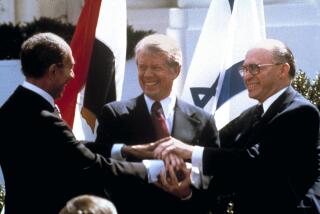At Last, a Treaty as Strong as the Poison-Gas Threat : Chemical weapons: The draft ban is sufficiently enforceable without being so stringent that no one will it.
- Share via
For more than 20 years, representatives of a diverse group of governments have sat in a large green room in Geneva talking about poison gas. Their elusive goal has been to complete a ban on the production, acquisition, retention, transfer and use of chemical weapons. During much of this period, the tedious pace of the negotiations would suggest to a casual observer that their goal was unlikely ever to be reached.
On Thursday, 38 member-states of this Conference on Disarmament will decide whether to accept the final compromise draft of the chemical-weapons ban and present it to the U.N. General Assembly. The treaty text is not perfect. But the delegations that worked on this final draft have reconciled widely disparate views. And they have largely succeeded in striking a delicate balance between the twin dangers that plague disarmament agreements: that it would be insufficiently enforceable to deter cheaters, or that it would be so stringent that countries wouldn’t sign it in the first place.
Without this treaty, there is no legal mechanism to keep these weapons out of the hands of irresponsible leaders in unstable regions of the world; nothing to prevent deviant governments from using poisonous gases against indigenous peoples, and no international law to prevent private companies (or wayward individuals hard-up for dollars) from supplying chemical weapons-related technologies to Third World dictators or terrorists.
Designing an arms-control treaty that will work is tricky: there is a trade-off between “ratifiability” and enforceability. Governments object to provisions that reduce their flexibility in conducting foreign policy and worry about giving others an excuse to inspect sensitive installations under the cover of phony allegations. Russian President Boris Yeltsin’s disclosure in May that the Soviet government had been engaged in biological weapons development in violation of the Biological Weapons Convention is the most recent confirmation that a treaty with no enforcement mechanism is not viable.
Governments should support this treaty for at least six reasons:
-- The treaty on the whole strikes a good balance between the competing objectives of ratifiability and enforceability.
-- Unlike the sole current international law governing chemical weapons, the 1925 Geneva Protocol, this treaty bans all use of chemical weapons, not just first use. This eliminates the possibility for states to justify use of chemical weapons by accusing their enemies of having used them first, as Iraq falsely accused Iran of doing during their war.
-- It proscribes sale not only of chemical weapons, but of precursors (chemical reagents used to produce chemical weapons), technologies and know-how, and requires that parties to the treaty enact domestic legislation to punish those that sell these items. If Iraq had been a party to such a regime in the 1980s, it would have been unable to use gas to kill Kurdish civilians (and Iranian soldiers) with impunity during the Iran-Iraq War. And the United States and its allies would probably not have been faced with the threat of Iraqi chemical attack in the Gulf War.
-- The dissemination of chemical defense to all parties in need offers several benefits: It would promote compliance with the treaty by increasing the cost of a stockpile large enough to inflict damage. It would make verification easier because the larger stockpiles required to circumvent defenses would be easier to detect. And it would make chemical warfare less dangerous should it occur.
-- The verification regime is far from perfect, but it would significantly raise the cost of cheating without imposing serious risks to sensitive facilities. The current text allows for details to be ironed out in practice. This would allow inspection procedures to incorporate some technological improvements that are now on the horizon.
-- It contains measures to provide for sanctions against violators. The ideal sanction would be one that was mandatory, because certain punishment is a better deterrent than uncertain punishment. But governments put a premium on flexibility, and a treaty that included mandatory sanctions would not be acceptable to most.
Some will say that the treaty is overly constraining because it commits the United States to a course of action without knowing which countries (allies or enemies) might be the subject of sanctions, or which countries might seek to use challenge inspections against us.
The treaty is, if anything, insufficiently constraining. It would be idealistic to think that countries would comply without an enforcement mechanism. And naive to think that an enforcement mechanism can be effective if the United States does not accept reciprocal obligations. The relatively stringent verification measures reflect negotiators’ desire to maximize the expected cost to a would-be miscreant, and to minimize the risk that commercial or government secrets would be compromised by intrusive, on-site inspections.
Chemical weapons have not been used against the United States or its allies since World War I. This treaty can’t guarantee that it won’t happen again, only make it far less likely.
More to Read
Sign up for Essential California
The most important California stories and recommendations in your inbox every morning.
You may occasionally receive promotional content from the Los Angeles Times.













